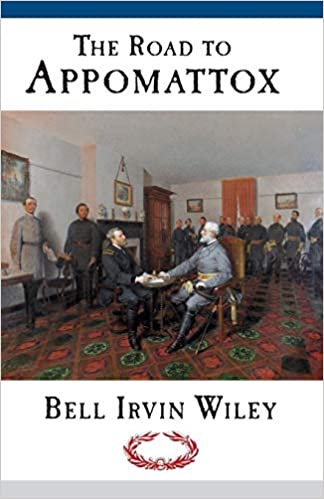



The Road to Appomattox
By Bell Irvin Wiley (Memphis State College Press, 1956)

A legend in the Civil War historical community, Bell Wiley was noted for his two seminal studies of the common soldiers of the Confederacy and Union: The Life of Johnny Reb was published in 1943 in the midst of World War 2, and The Life of Billy Yank came out a year before I was born in 1952. While not a prolific author, Wiley (1906–1980) makes a point I have long maintained: that a great historian only has a few books in themselves because of the time involved in researching, validating, and synthesis of that data to make a work of historical interpretation. Wiley focuses his epistemology on common folks and society, and that bears out in this work.
The genesis of The Road to Appomattox is pretty simple: a series of lectures from Wiley at Memphis State University. Wiley had been a professor at Southern Mississippi, Ole Miss, LSU, and at the time he had published his two great works and was a professor at Emory University, where he would be mentoring future historians like Richard McMurray. The sponsored lectures gave Wiley an opportunity to develop a strand of thinking about why the South lost the Civil War. The university used those lectures to create this published record of that oral event.
It is not clear to me if Wiley delivered a written lecture, in which case the book’s three chapters may be directly from his text narrative; or if he delivered the talks without notes and this is a transcription. Regardless, Wiley surely had the opportunity to revise and resubmit his thoughts, resulting in a refined and thought-provoking monograph.
Three chapters and a total of 121 pages, and yet a very clear and endlessly fascinating opportunity for Civil War buffs and current historians to grab aspects of his arguments and argue them pro or con. In the first chapter, “Reluctant Helmsman, Jefferson Davis,” Wiley analyses the leadership or lack thereof of Davis’s presidency. Generations of historians have considered Davis as one of the reasons the South had to lose. His personality and his leadership style marginalized the talents of his subordinates and created friction that worked against a unified war effort. The personification of failure embodied in Davis is certainly a constant thread of those who suggest he was responsible for the Confederate defeat. Wiley hits the key elements of this argument and offers his own conclusion: that through the historian’s eyes, Davis’s “record as President leaves more to condemn than to praise.” Strike 1!
The second chapter leaves Davis and addresses the “Waning of the Southern Will.” There is a Trinity of War that speaks to the three legs of a successful war prosecution, a key element of which is the will of the people to wage war. I am reminded of the famous scene in Gone with the Wind in which the Southern cavaliers speak in braggadocio that “one Southerner can whip twenty Yankees”—”Gentlemen always fight better than rabble.”
The progression and indeed long-standing animus between North and South is rooted in the personal nature in which the South experienced the war. That brutal reality that resulted in the destruction of their society was experiential and ideological, and Wiley’s chapter analyses how that reality drove down and eventually created an atmosphere in which the destructive end was both probable and dreaded. When it came, the residual animosity was real, and history has shown us that it has passed through generations. Wiley notes that certainly, not all Southerners had abandoned the cause, but that those less invested in southern independence sought a return to the status antebellum more quickly. Whereas, southern women who had soldiers in the army—and many of the soldiers themselves—never abandoned hope, and, indeed, while Wiley did not delve beyond the surrender, we saw the reaction of the surviving Southerners in various venues. History in this instance is instructive, and Wiley makes a compelling case for the behavior we observed in the subsequent 150-plus years. Strike 2!
The culminating lecture, “The Failures that were Fatal,” is a rich compendium of social characteristics within the southern society that worked against a harmonious effort to establish a new southern nation. He analyses the limitations of a largely rural community in which widespread communication and interaction were not present’ Finally, the weight of international opinion is factored into the equation. Wiley concludes that southern morale began to collapse in the spring of 1862 following Confederate defeats in the West and resulting legislation that was anathema to a relatively independent society. Wiley postulates that after the spring of 1862, the South’s only realistic chance at independence was the collapse of the northern will to wage war, a prospect that Wiley concludes was unrealistic, as northern nationalism and devotion to the Union were strong enough (as displayed in Lincoln’s overwhelming reelection) to see the war through to a successful end. Strike 3! You’re out.
I found this book very instructive in that the academic argument was made more than 67 years ago. The analysis is cogent and consistent with Wiley’s primary intellectual interests. I think our members will benefit from seeking some of these older works and comparing them with new perspectives that are intellectually honest. A worthwhile read for all serious Civil War students and a meaningful validation of Carl von Clausewitz’s primary lesson in his timeless book Das Kreig (On War): War is an extension of domestic politics, “the proverbial “Will of the People.”
–Len Riedel
BGES Executive Director
You must be logged in to post a comment.